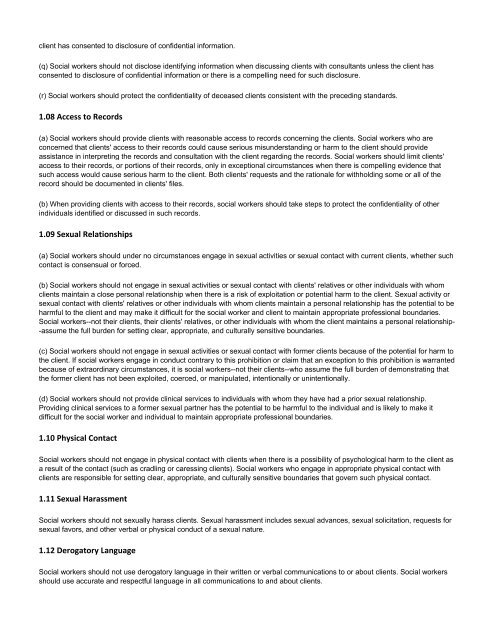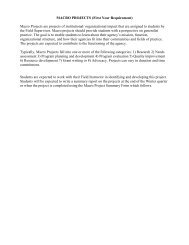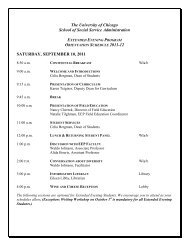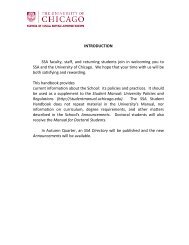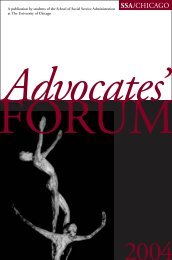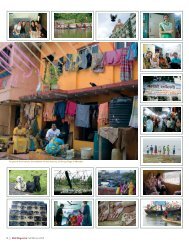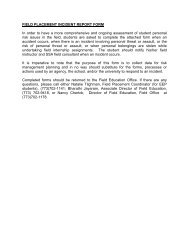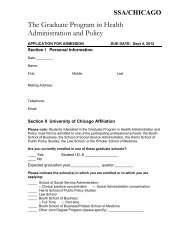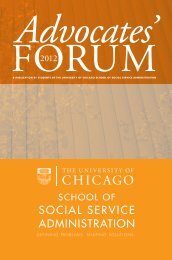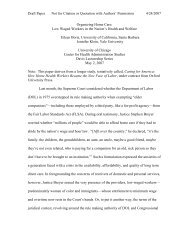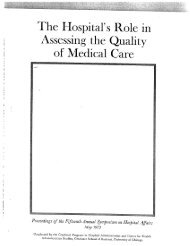The University of Chicago School of Social Service Administration
The University of Chicago School of Social Service Administration
The University of Chicago School of Social Service Administration
- No tags were found...
You also want an ePaper? Increase the reach of your titles
YUMPU automatically turns print PDFs into web optimized ePapers that Google loves.
client has consented to disclosure <strong>of</strong> confidential information.(q) <strong>Social</strong> workers should not disclose identifying information when discussing clients with consultants unless the client hasconsented to disclosure <strong>of</strong> confidential information or there is a compelling need for such disclosure.(r) <strong>Social</strong> workers should protect the confidentiality <strong>of</strong> deceased clients consistent with the preceding standards.1.08 Access to Records(a) <strong>Social</strong> workers should provide clients with reasonable access to records concerning the clients. <strong>Social</strong> workers who areconcerned that clients' access to their records could cause serious misunderstanding or harm to the client should provideassistance in interpreting the records and consultation with the client regarding the records. <strong>Social</strong> workers should limit clients'access to their records, or portions <strong>of</strong> their records, only in exceptional circumstances when there is compelling evidence thatsuch access would cause serious harm to the client. Both clients' requests and the rationale for withholding some or all <strong>of</strong> therecord should be documented in clients' files.(b) When providing clients with access to their records, social workers should take steps to protect the confidentiality <strong>of</strong> otherindividuals identified or discussed in such records.1.09 Sexual Relationships(a) <strong>Social</strong> workers should under no circumstances engage in sexual activities or sexual contact with current clients, whether suchcontact is consensual or forced.(b) <strong>Social</strong> workers should not engage in sexual activities or sexual contact with clients' relatives or other individuals with whomclients maintain a close personal relationship when there is a risk <strong>of</strong> exploitation or potential harm to the client. Sexual activity orsexual contact with clients' relatives or other individuals with whom clients maintain a personal relationship has the potential to beharmful to the client and may make it difficult for the social worker and client to maintain appropriate pr<strong>of</strong>essional boundaries.<strong>Social</strong> workers--not their clients, their clients' relatives, or other individuals with whom the client maintains a personal relationship--assume the full burden for setting clear, appropriate, and culturally sensitive boundaries.(c) <strong>Social</strong> workers should not engage in sexual activities or sexual contact with former clients because <strong>of</strong> the potential for harm tothe client. If social workers engage in conduct contrary to this prohibition or claim that an exception to this prohibition is warrantedbecause <strong>of</strong> extraordinary circumstances, it is social workers--not their clients--who assume the full burden <strong>of</strong> demonstrating thatthe former client has not been exploited, coerced, or manipulated, intentionally or unintentionally.(d) <strong>Social</strong> workers should not provide clinical services to individuals with whom they have had a prior sexual relationship.Providing clinical services to a former sexual partner has the potential to be harmful to the individual and is likely to make itdifficult for the social worker and individual to maintain appropriate pr<strong>of</strong>essional boundaries.1.10 Physical Contact<strong>Social</strong> workers should not engage in physical contact with clients when there is a possibility <strong>of</strong> psychological harm to the client asa result <strong>of</strong> the contact (such as cradling or caressing clients). <strong>Social</strong> workers who engage in appropriate physical contact withclients are responsible for setting clear, appropriate, and culturally sensitive boundaries that govern such physical contact.1.11 Sexual Harassment<strong>Social</strong> workers should not sexually harass clients. Sexual harassment includes sexual advances, sexual solicitation, requests forsexual favors, and other verbal or physical conduct <strong>of</strong> a sexual nature.1.12 Derogatory Language<strong>Social</strong> workers should not use derogatory language in their written or verbal communications to or about clients. <strong>Social</strong> workersshould use accurate and respectful language in all communications to and about clients.


